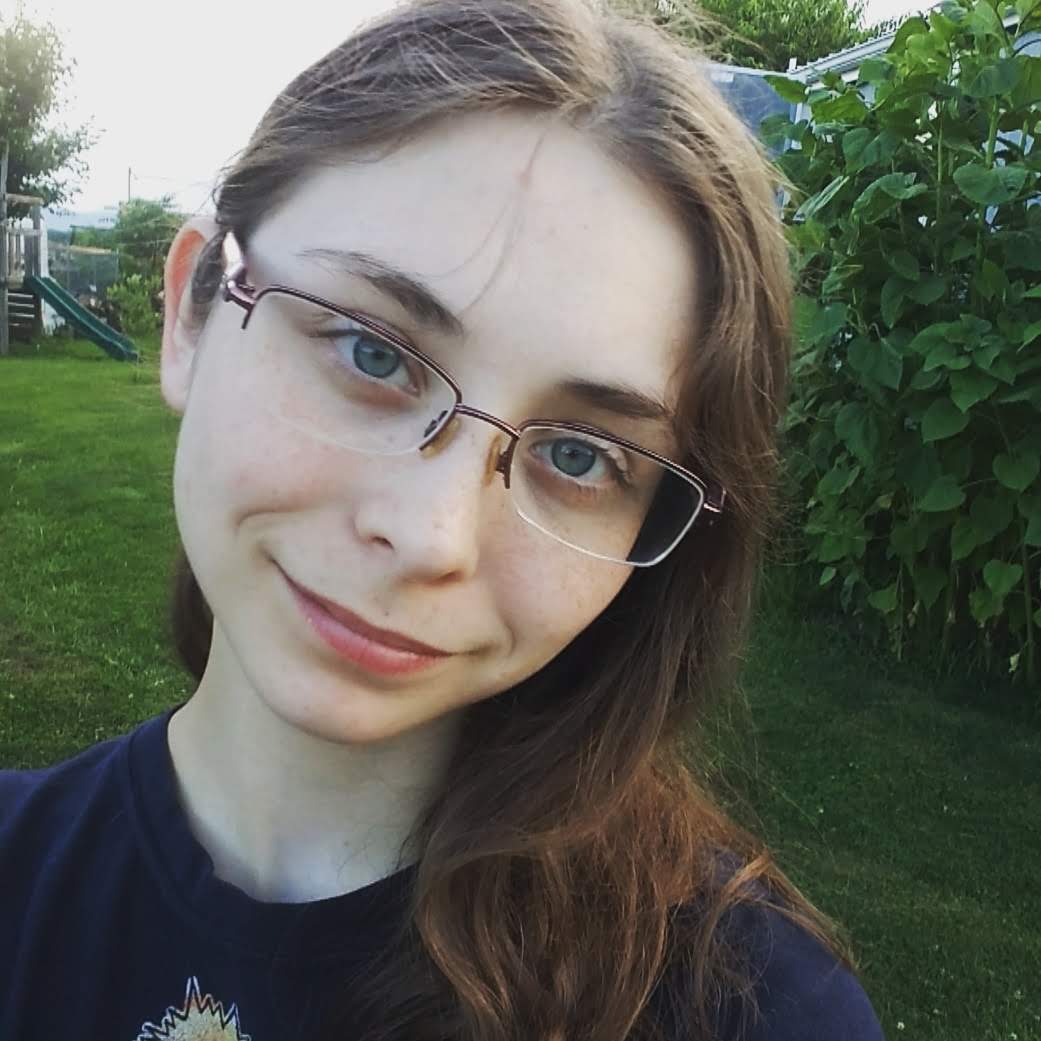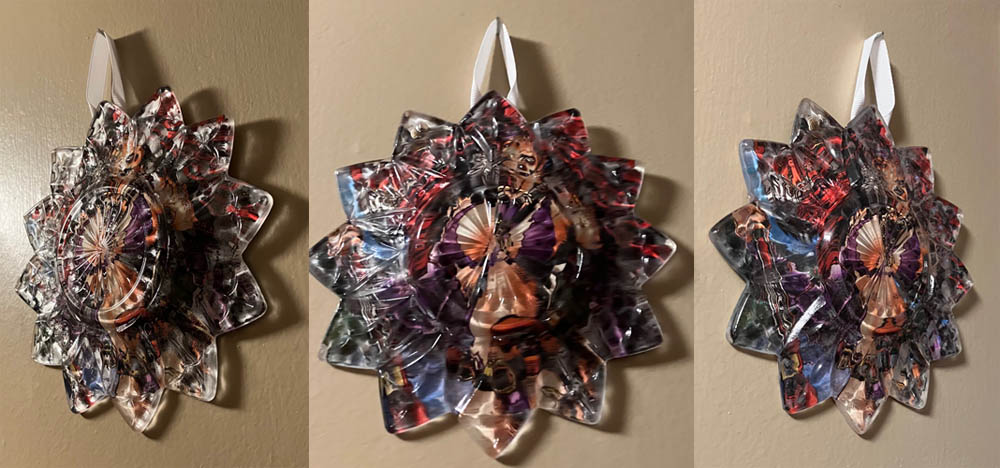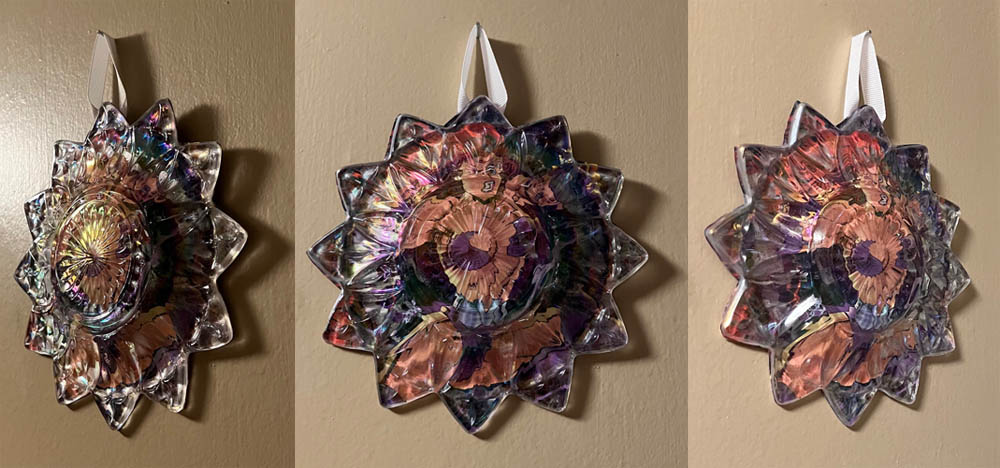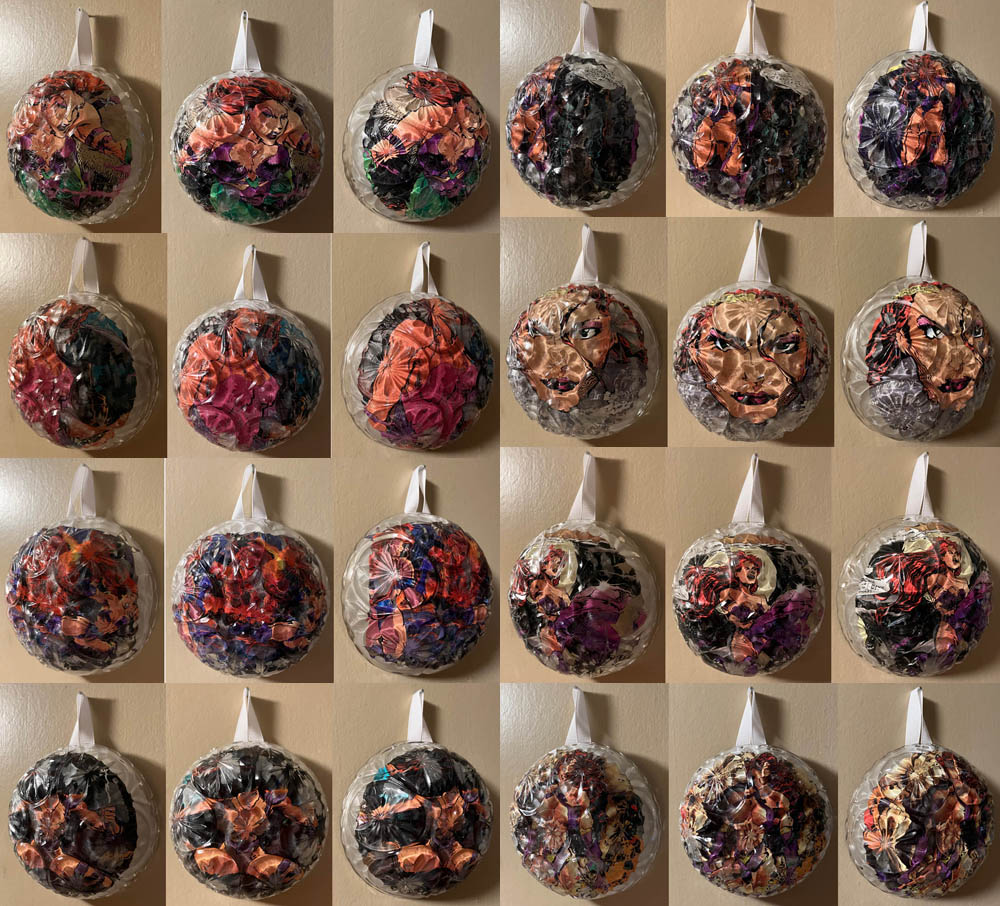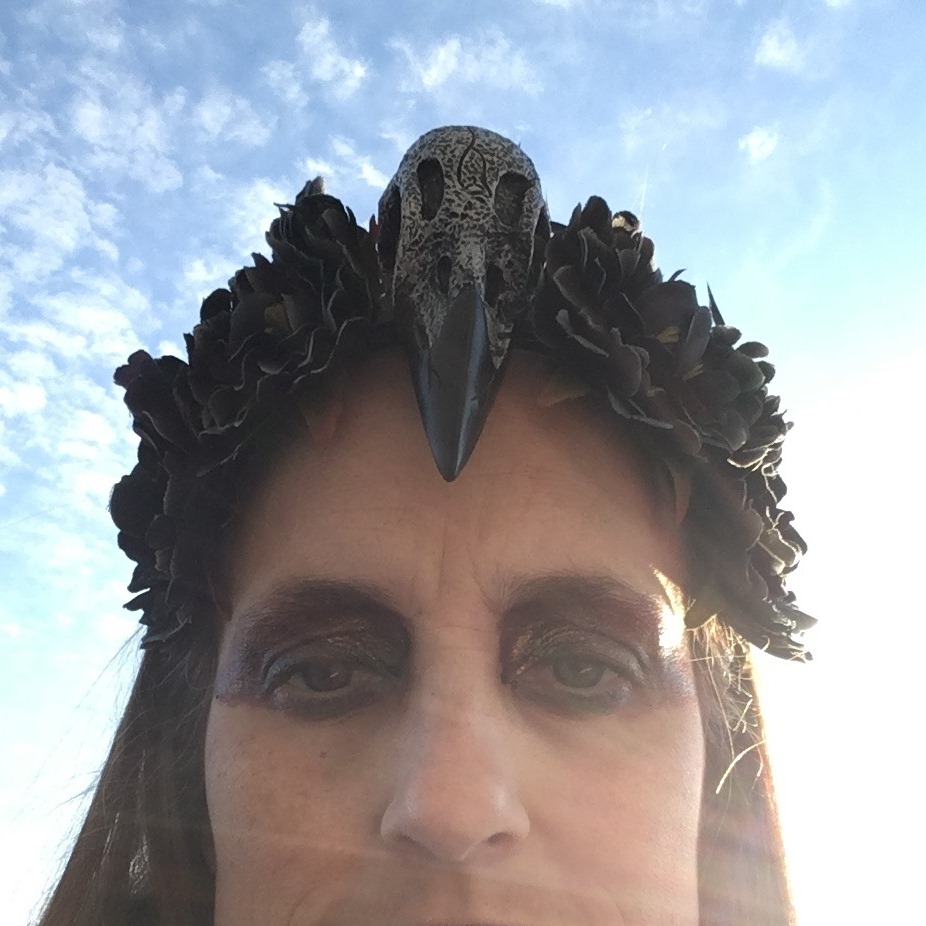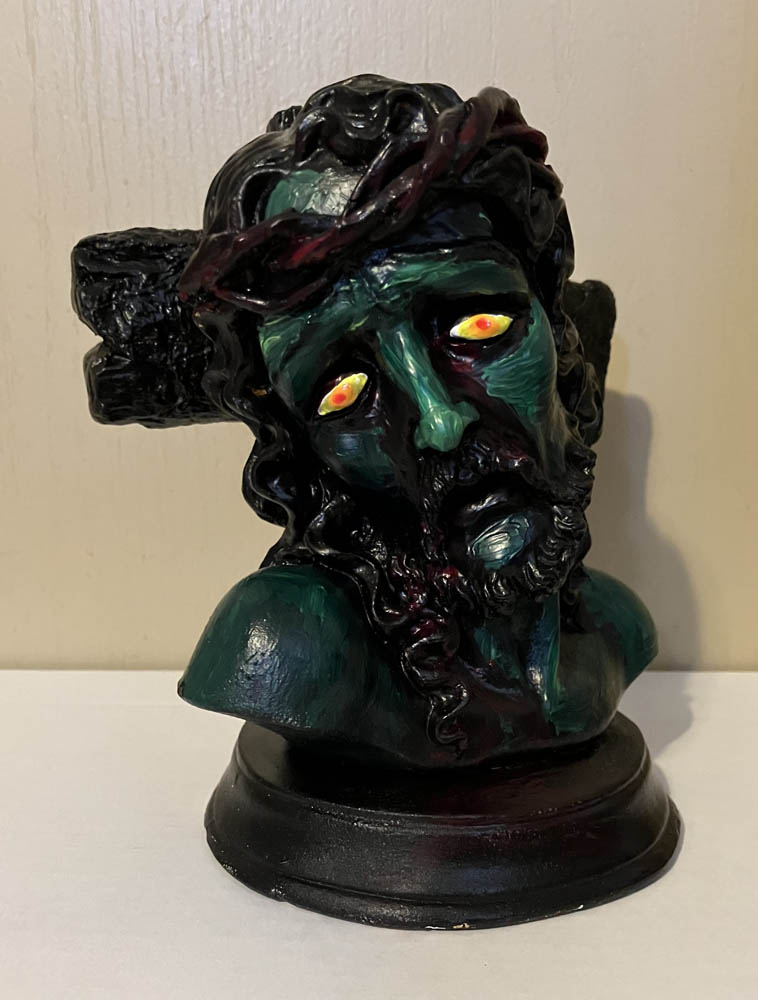
Haunted MTL Original – The Grand Finale – Liam Moran
More Videos
Published
3 years agoon
By
Shane M.
“The Grand Finale” by Liam Moran
I’m one of the few who can honestly say they were there when the big change happened in the literary community. There were eighteen of us to be exact; most of us came alone. Several others will tell you they were there and recount their stories. Ninety-nine percent of the time they’re full of shit. But I’ll tell you how it started. I was there. I saw the truth.
We were in this dive bar called The Starving Artist. It got its name from a pair of friends—one wannabe writer and one wannabe actor—who realized they’ll never support themselves on their coveted jobs, so they opened a bar with a suitably self-deprecating name. The actor died of an overdose a few years back, so only the failed writer runs the place now.
But when they first opened it, and to this day, they wanted to make it unique, so in the corner of the bar was a stage where people would do standup or read their short stories or poetry or grab an acoustic guitar and sing their sorrows. Every once in a while, someone would try an incredibly low-budget play. No one really listened to anyone who was performing that much, unless the performers brought friends. Typically, the people would mull over what they hate about their lives and drink away their sorrows. Occasionally they’d listen for a minute or two, but then go back to their own business and order another drink. When you performed you neither did nor didn’t perform in a way. I, personally, wouldn’t count it as performing. There wouldn’t be any applause. There wouldn’t be any boos. Nobody listened after all.
The place was dark. On the walls you could see the bookshelves the owner put there, but from more than five feet away you couldn’t read what the titles of the books were or who the authors were. The place stank of stale booze, body odor, and cigarettes. A hazy fog of smoke hung thick in the room.
Out in the back, behind the dumpster, there was usually someone pedaling drugs ranging from low-grade pot to black-tar heroin. It was a hotspot. Everyone knew, but none of the patrons said anything. They weren’t affiliated with Sammy or his staff, but Sammy figured a man’s got to make a living, whether through the honest way or not.
Anyway, it was at this hole-in-the-wall dive bar where dreams go to die, that I was tossing back my fourth or fifth Tullamore Dew when this guy comes on stage shaking, but with emotion, not fear. His eyes were fearless if I’ve ever saw it. He spoke as though it was hard to talk—his voice cracking and everything—with his eyes wet with tears. Good poet or not, I had to give it up for this guy’s stage presence.
He said his poem was called “The Grand Finale”. Then he started to read. It wasn’t all that good; it was a little too melodramatic for my taste, but his presence was gorgeous. I truly believed he believed in his shit. The content was a subpar depressing poem about a man questioning if he wants to end his life or not. We’ve all heard these types of poems a bunch of times, but his presence: my God!
He was shaking and choking on his words. It was hard to see because it was so dark and there was such a thick cloud of smoke in the air, but I think he managed to squirt a tear or two out. This guy may not be the best poet, but I figured if this doesn’t work out for him, he should definitely try acting.
So he rambled about being friendless and how his family turned their backs on him and he lost his faith and all that whiney-shit. But the tremoring, the redness in his eyes, the forced cracking words being pushed out of a dry throat, the pauses for him to swallow back tears; now that was the real show. That was the real art.
My belief in his fearlessness started to change a bit. Something about him made me think that he was in some way scared—just not about performing. He had no issue with that, but there was something else that I just couldn’t figure out.
I ordered my fifth or sixth whiskey and watched this man bare his soul. I took a few hits from the drink and soaked in his performance.
On his last stanza, he reached into his coat pocket and pulled out a gun. Nobody screamed, but slowly the room became silent and they focused on the man holding the gun. The man was straight up sobbing, and finally I realized what he was scared of.
We all said we didn’t know what was going to happen—some of us even managed to convince ourselves—but we all knew. We really did. But to interrupt such a performance would be a greater sin.
I can’t tell you how the poem began, or any of the lines in the middle, but I can tell you the last one; I’ll never forget it.
The man put the gun to his head and said, “And that is my grand finale.” He paused, choked back some tears and then croaked, “Goodbye.” Then he pulled the trigger and blew his brains out in front of the enraptured eighteen people.
Most people would assume that after such a scene everyone would scream and a chaotic Helter Skelter commotion would ensue. But at this poetry reading late in the night, there was nothing but serenity and admiration.
When it happened, everyone was silent. Nobody moved as the gunshot echoed in our ears. We held our drinks stationary and we sat there shocked. Then somebody started clapping. Another man joined him. Within a matter of seconds, we all were clapping and shouting our congratulations. It was beautiful. None of us had seen anything like it. A poem had to be honest if you gave it that kind of an ending.
The problem people had with poets—mainly poets who use poetry as a way to cope, which is most of them—is that they talk about their depression and hopelessness and despair, but nobody could fully know if this was true or not. As for that corpse that laid in front of us, nobody doubted his depression. Nobody doubted his hopelessness. Nobody doubted his despair. How could you? His body was still warm even though a quarter of his head was missing. He not only wrote about his pain; he followed through with it. He was the only real poet any of us ever knew.
The applause continued for several minutes even though nobody took a bow, and nobody was there to realize we were applauding them. But we did it for the art. We did it for the honesty.
The police and ambulance showed up. I always wondered why they even bothered calling the ambulance when the top of his head was missing. He shot a magnum revolver clean through temple to temple. I don’t think any EMT could fix that at that point. Even Dr. Frankenstein would need an intact brain.
One of the men who was at the infamous and seminal performance was a literary critic for a magazine. He wasn’t expecting to go there for a story; he was just grabbing a drink to not focus on life like the rest of us. But he found his story there and wrote a cover story on ‘honest realism’. It was realism all the way through. You don’t stop at an ambivalence to suicide or alluding to suicide, you go all the way. The literary crowd ate it up. We found out the poet’s name: Guy Sanders. Nobody heard of him before, but now he was the hottest name in town. Nobody knew anything else about him, and few people could quote more than one line that he had written, but he was a sensation. He built up a fan base and, over time, imitators.
#
It started off with people trying to make a name for themselves. Nobodies who saved up a particular short story or poem as their farewell, read it, and killed themselves to the sound of booming applause. The government wouldn’t allow public suicide, so they used a euphemism. They would say they were performing their ‘Grand Finale’, and everyone knew what it meant.
They sold out theatres—and these were nobodies—and people would camp outside to buy tickets to their suicides. They outsold the bigtime poets and authors, whether their fame came from being critically acclaimed or from commercial popularity, it didn’t matter. People didn’t want to see them; they’d much prefer to see a nobody slice their neck open or swallow a bottle of sleeping pills as they drift into nothingness. So the bigtime authors and poets had to join the fray if they wanted their legacy to stay relevant.
The ones who made a name for themselves previous to the spate of public suicides had an advantage. They would say they were doing readings across the country—the more popular ones went across the world—saying that this was their ‘Farewell Tour’. Performing their ‘Grand Finale’ was code for a stage event; but if they were going on tour it was, ‘Farewell Tour’. That was code that they would commit suicide somewhere on that tour. The benefit to this was they could drag it out and get more fame or money for this.
There was still a benefit for getting money. Even if you did die, you got to decide what happens with that money afterwards. Many writers are narcissistic people, so several of them chose to build monuments in their honor. Others chose a beneficiary, like a friend or family member. Whatever you chose to do with your money after you died was your business; it was up to the place holding the event or tour to follow through with it and obey your wishes.
The phrases started coming out. “Anybody who’s anybody in literature is dead.” “You have to be dead to be in this business.” A Time magazine cover read, “Can Death Breathe New Life into Literature?”
#
It was during this new and exciting time that I tried to climb aboard this train, only I didn’t want to die. Luckily for me, I had my brother who was a doctor, and my best friend was a plastic surgeon. The plan was set.
I gave my first performance of “The Grand Finale” and was shocked by how many people came. I’m embarrassed to say that I had stage fright. I felt envious of all those other performers who did this before me. Granted, if all goes according to plan, nobody will recognize me, but unlike me, they never intended to perform again.
So, I did my act, performed my “Grand Finale” and then downed a bottle of pills and felt myself drift into nothingness. By the time I lost my ability to move and felt myself drifting away, the curtain dropped accompanied with thunderous applause. I closed my eyes and it all went black.
When I came to, I inhaled in shock as I smelled burned hair. My chest burned and I noticed an AED machine hooked up to me. I was lying in the back of the van with my brother, Harry, leaning over me.
“Jesus, Chuck,” he said to me, panting only slightly less than I, “I thought I lost you.”
“Sorry to disappoint,” I said through deep gasps.
Harry inserted a syringe into a vein in my right arm and muttered, “To counteract the pills.”
“I’ve never been one for needles, but I think I can officially say I’ve made bigger sacrifices to make the big bucks.” I smiled.
“Fuck, you’re crazy,” my friend Reggie said from the driver’s seat. “I can’t believe I signed up for this.”
“It’s because you know as crazy as it might be, it’ll make all three of us rich as kings,” I told him.
“So what do we do now?” Reggie asked.
“You got the corpse?” I asked.
Hank unzipped the body bag next to me. The body was fresh—almost as if it rose six feet as soon as it went six feet under. The face that looked back at me was an almost uncanny resemblance of mine.
“Spooky,” I muttered. “Got to hand it to you Reggie, you’re a damn good plastic surgeon.”
“You’re a sick man, Chuck,” Reggie says. “And you’re helping to dig up the body next time. I’m not a superstitious man, but gravedigging at the dead of night can give anyone the creeps.”
“Come on,” I told him. “I’m already putting in most of the risk as is.”
Harry was checking my vital signs when he grunted matter-of-factly, “It would reduce the time of our highest potential of getting caught by a third.”
“So…,” Reggie said, “anyone willing to answer the question I asked earlier? What do we do now?”
“We drop dead-me off at the hospital,” I nodded my head over to the corpse beside me, “then we keep real-me hidden until they pay Harry, then we move, you change our faces, we change our identities, and then we keep doing it until we’ve all made enough money to never work again,” I said matter-of-factly.
And that’s exactly what we did. I put down my brother, Harry, as the beneficiary to my staged suicide, so we all waited for a check to come in the mail and eagerly waited to see how much it was.
“Seventy-eight thousand?!” I shouted. “I killed myself up there and they don’t even give me six digits?!” I paced around steaming and ranting.
Reggie piped in, “The problem is the pills. Nobody wants to pay that much to see a man slowly fade away. They need something more dramatic, realer.”
“Please,” I said. “The audience never knows which way one of these suicides will go, so the method isn’t the problem. Maybe it’s just bad luck. We’ll try this again and see what happens.”
So we changed faces, changed identities, and did it again—this time with a noose. I hung in front of the crowd for a long period of time with a makeshift knot to avoid complete suffocation. Unfortunately, our tying skills weren’t the best, so I did choke a bit on the noose. My limbs went numb as the curtain dropped and, as I saw my brother and Reggie hurrying toward me, I blacked out from the lack of airflow. Once they dragged me outside and the coast was clear, Harry performed CPR and, just like that, I was brought back to life.
I coughed and regained my terrified suffocated breaths. We got the check and it was up to a couple hundred grand. That’s when I realized this was going to take longer than I thought, so I devised a new plan.
After moving and changing my identity once again, I got a novel published, which was pretty easy now that a large percentage of writers have offed themselves. Now there’s less competition. So, I build up a bit of notoriety, and then I let it leak all over social media, that I will be doing my “Farewell Tour” in two years to this date. I also let rumors leak on the internet that it will be a bloody ending. I pump out two more novels in that time and then I begin my tour. This time we’re not holding back. The audience wants gore, so that’s what we’re going to give them.
#
I wait until the very last day of the tour so I can soak up as much money as I can. Now that the Grand Finale is finally here, and everyone knows this is my last opportunity to kill myself, the place is packed.
Now this is the payoff. This is what’s going to make Harry, Reggie, and I never have to work a day in our lives again.
So, I give my reading, and get to my Grand Finale. I think I’m overacting. The first couple of times it seemed easy to shake and mimic the emotion of the first literary suicide I witnessed at The Starving Artist all those years ago. But now, with two suicides already under my belt, I don’t feel as scared. I’ve become used to killing myself at this point.
I get to the end of my Grand Finale and then slit my wrists and just stare downward in the chair. The applause comes in slow, but then picks up and soon people are screaming and whistling as if they’re asking for an encore they can’t possibly receive.
I look upward for a second and realize no curtains are dropping. Why’s it taking so long?
The blood continues to pour out of me and onto the carpet as the crowd gets louder and louder. When is the curtain going to drop? I wonder.
My head grows faint, and the place starts to look dimmer. There’s a lot more blood than I expected. I start to fear I may have nicked a major artery. It’s harder to see. It seems foggier. For some reason I’m reminded of the smoke-filled ambience of The Starving Artist.
When it’s too hard to lift my head, I see Reggie and Harry sprinting right at me—clearly visible by the entire audience—and then I drift off.
#
I come to in the back of a van again with a blood bag in an IV hooked up to my arm. My brother’s bright red, surgically altered face shows pure panic as his usually calm and steady hands shake in terror while trying to suture up my wrists.
“His eyes are open!” He shouts over his shoulder, then turns to me. “We’re taking you to a hospital. We have no other choice. Just hang on!” my brother screams.
I try but can’t speak. I see a tear roll down my brother’s cheek.
“You think we’re still getting paid?” Reggie asks from the front seat.
“Shut up, Reggie!” my brother shouts.
“I just want to make sure it wasn’t all a waste, you know,” Reggie says. “In his memory.”
“Shut the fuck up, Reggie!” my brother shouts once again. Then he turns back to me and frantically chants, “Come on, Chuck! Hang in there! Come on, you can do it!”
My eyes get foggier and dimmer, reminding me about the dim, smoke-filled room where Guy Sanders gave the only performance anyone could remember from him.
I’m fading. I grow cold. I need to accept it. Whether willingly or accidentally, in a packed auditorium or alone in a hospital bed, we all give our grand finale sometime.
END
Liam Moran has been published in Coffin Bell Journal, Ripples in Space, and Haunted MTL, and his two novels, ‘Saving Fiction’ and ‘Love is Delusional’ are available on Amazon. Originally from Levittown, New York, he now resides in the suburbs of Chicago, where he enjoys reading, writing, and catching the Sunday games with some friends at a local sports bar, where he engages in his love/hate relationship with the Buffalo Bills. He invites fans to follow his Facebook page @LiamMoranAuthor or go to his website at amazon.com/author/liammoran and to feel free to message him if they so desire.
You may like
Original Creations
Peeping Toms Comic Book Collage Crystal Art by Jennifer Weigel
Published
5 days agoon
July 21, 2024
So I happened upon this very cheesecake-heavy premiere issue of Extremes of Violet, complete with pinups by some of the comic book greats of the time, and decided to make some Peeping Toms collage art by incorporating the voluptuous vixen into various crystal pieces to create a sort of fishbowl effect centered largely on her bosom (which is unavoidable).
Each of the Peeping Toms is shown from three angles because of how much the pieces shift as the light plays off the crystal. I started with these star forms.
The second bowl was even a bit iridescent, and violet at that!
Next I did a series of really perky busty bowls, which really get the feeling across that you are looking through the tiny peephole in a door as well as exemplifying the content even more. Note: these are shown in two rows with side details as well, so there are a lot of pics here…
I experimented a little and tried a couple of other scenes, like the portrait, as well. She’s staring back at the Peeping Toms…
I also tried this more square bowl form.
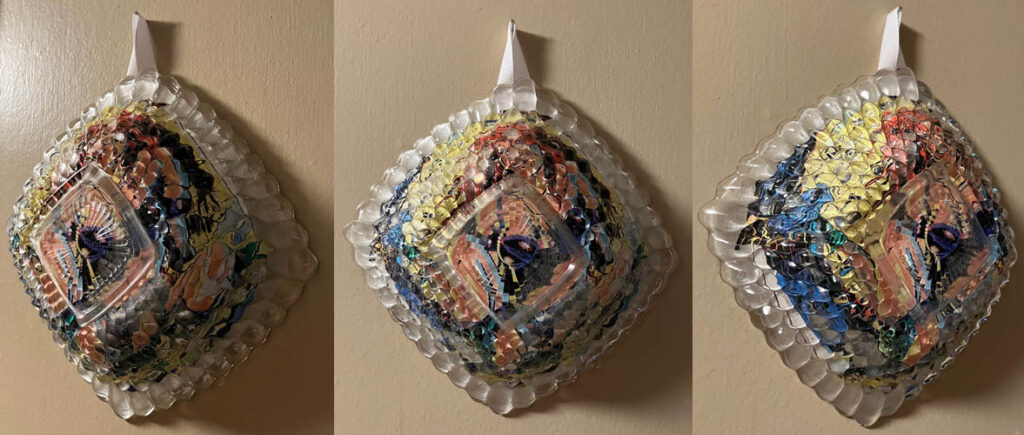
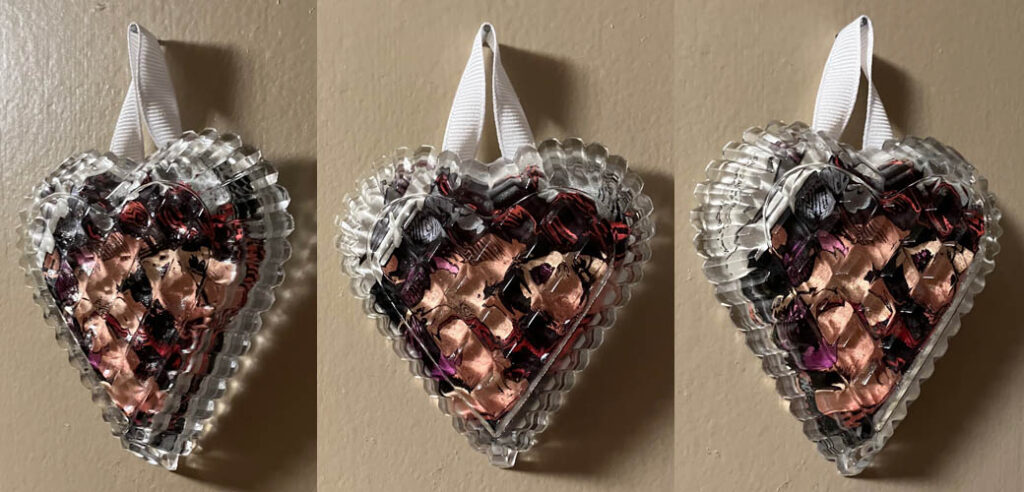
And finally, I found this little heart, which is my personal favorite of the group.
These works are a continuation of my Creepy Comics collage series, shown on Haunted MTL here.
Creepy Comics 5
Feel free to check out more of Jennifer Weigel’s work here on Haunted MTL or on her writing, fine art, and conceptual projects websites.
Original Creations
Zombie Christ – Second Coming Art by Jennifer Weigel
Published
2 weeks agoon
July 14, 2024
So I probably should have taken a before picture, but I found a faux wood stained plaster Jesus statue and turned it into Zombie Christ. Because it’s the second second coming. Or something. It’s kind of an offshoot of my nail polish paintings reappropriating thrift store art…
Anyway without further ado, I present…
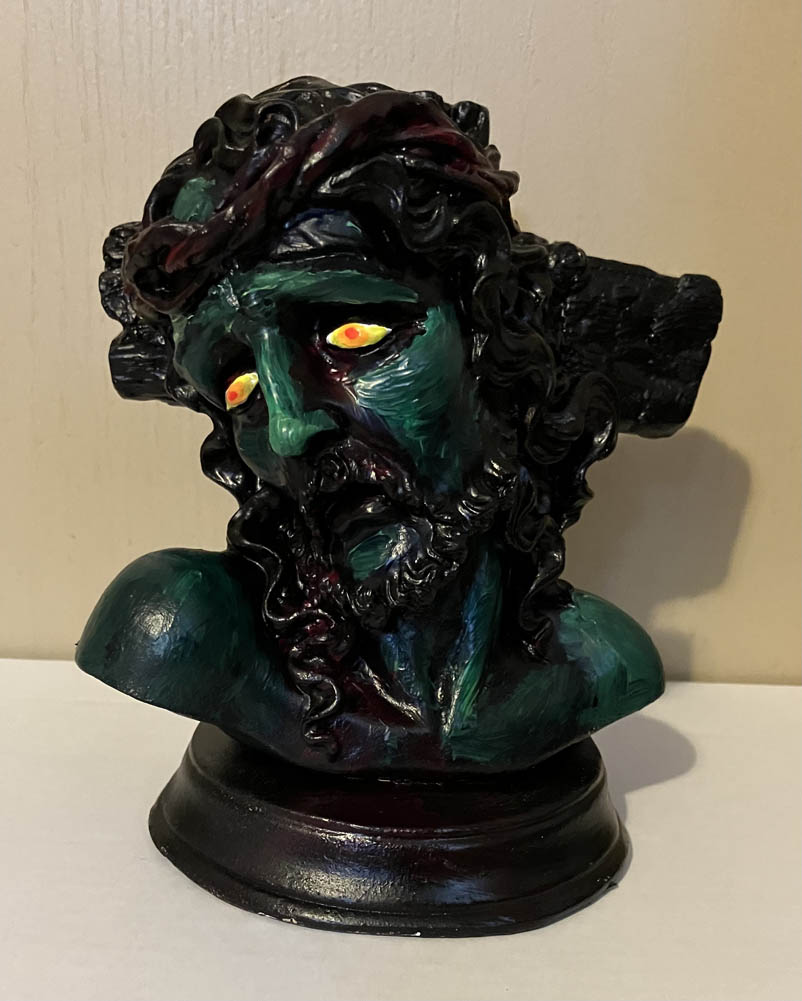
I was a little concerned that I made him too green at first, but I’m happy with the finished result. This statue just looked so anguished. It’s eyes had been closed but I like them better open and even painted them with blacklight reactive nail polish so they will stand out even more and be interactive in other ways to add creepy factor.
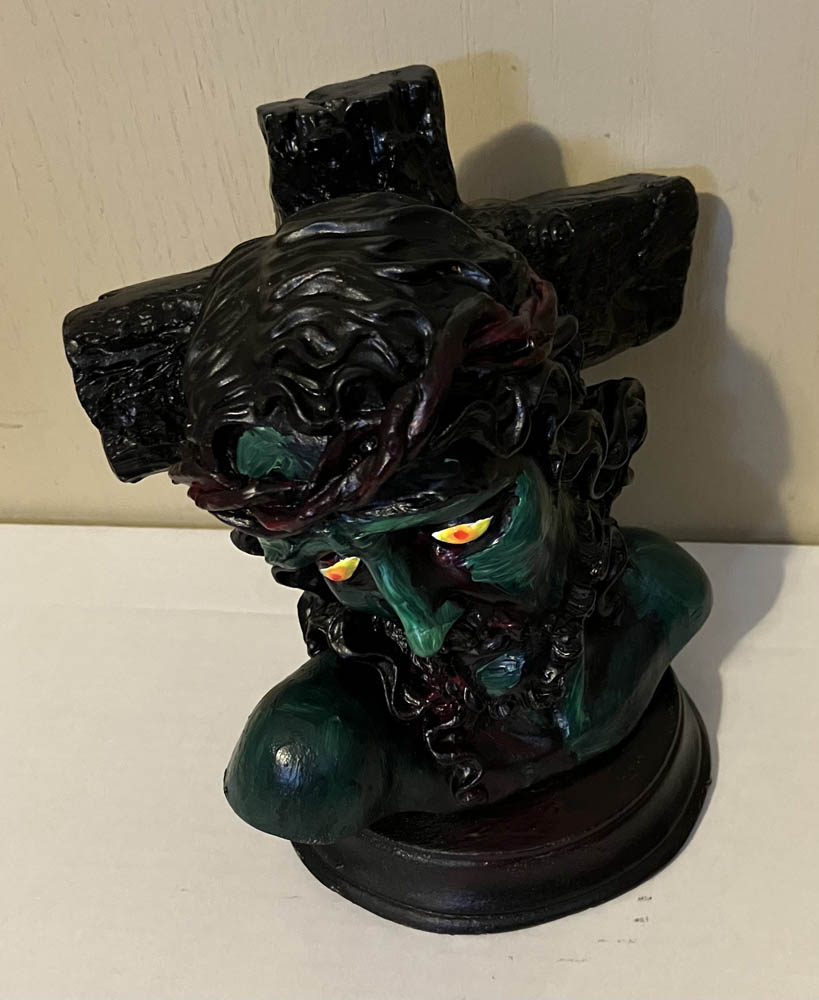
Sadly I don’t have a blacklight anymore or I’d share a picture that way too. Oh well. I’ll leave you with a fun detail shot instead.
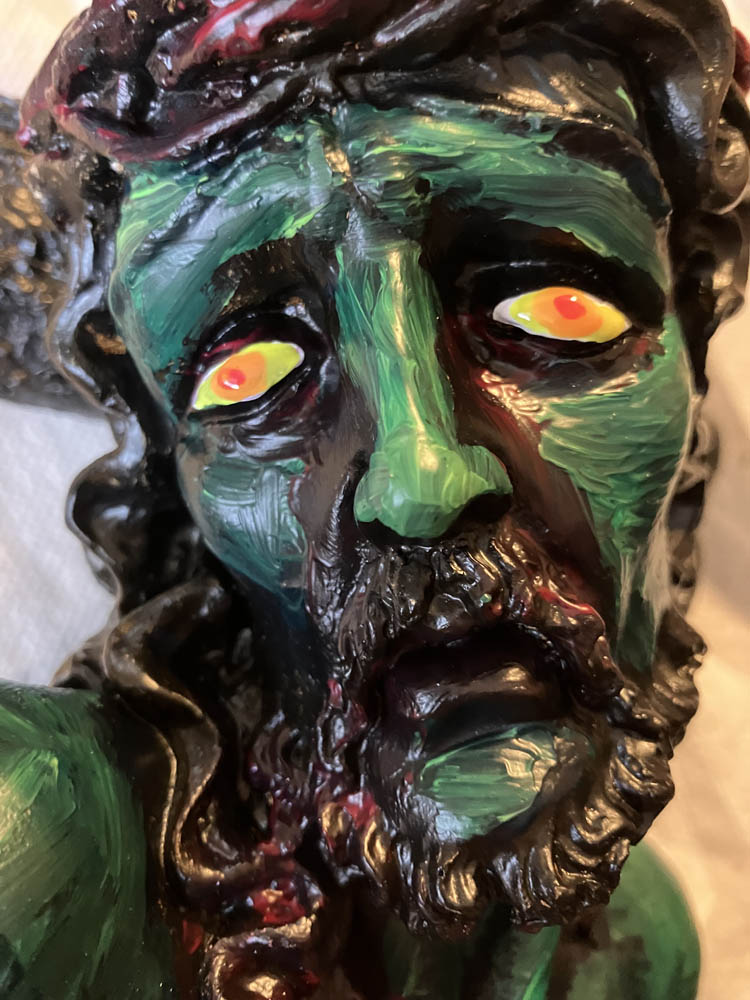
Next time I may make him more gray than green though. We shall see…
Feel free to check out more of Jennifer Weigel’s work here on Haunted MTL or on her writing, fine art, and conceptual projects websites.
Original Creations
Jennifer Weigel Art Collection Highlights Part 3
Published
3 weeks agoon
July 7, 2024
So it’s been awhile since we’ve looked at some of the things I have gathered, so I thought I’d bring back my art collection for another round… Here are the first and second highlights in case you missed earlier explorations.
From left to right: M Pena Windstone Editions bat-winged flap cat, bone mask by Terry and Susan Wright, wood cat in skull by labcreature, real hair art by myself, pencil drawing of Barbarois Elder for Vampire Hunter D anime cel
From left to right: Barbarois Elder for Vampire Hunter D anime cel, Turn Me Royal portrait of my father and stepmother as Frankenstein’s monster and his bride, painted horse skull
Left to right: Overgrowth by Ellie Bradley, heart by TenderFlesh, praying devil girl by Torman’s Treasures
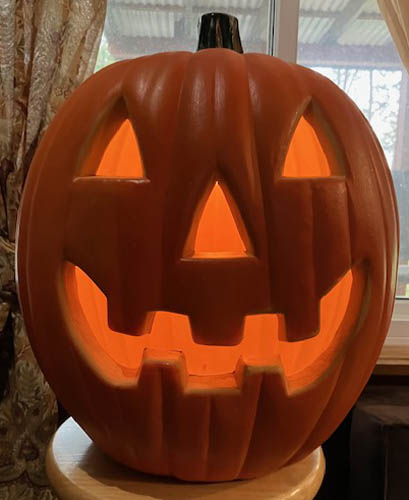
And a vintage plastic 2-foot Jack O Lantern I got at a yard sale and have kept on display on his very own stool in the living room since. So happy.
Anyway, there are some more highlights from my art collection, as it is always growing and evolving. I have lucked into several of these pieces at antique and thrift stores or acquired them from the artists or more. And yes, I still have Da Ting the taxidermy shih-tzu from the first of these posts.



